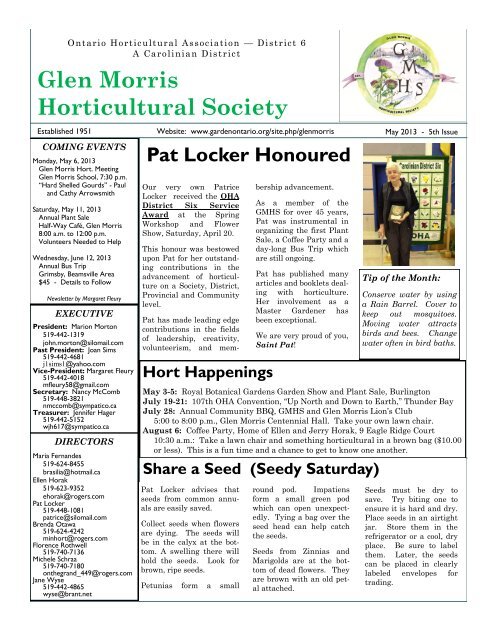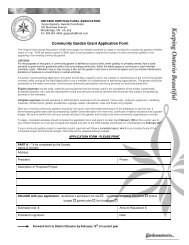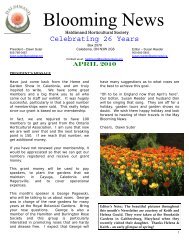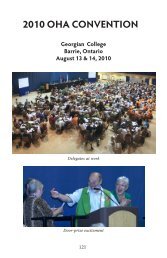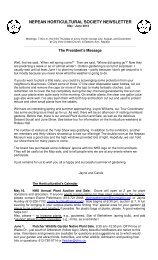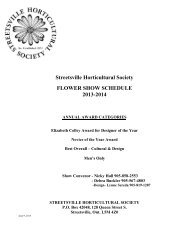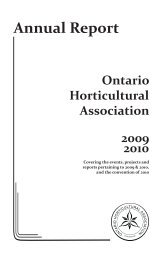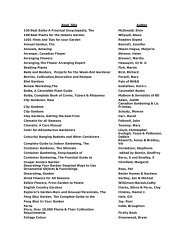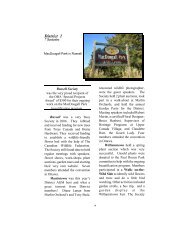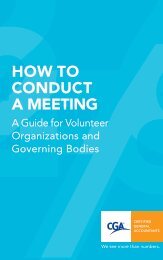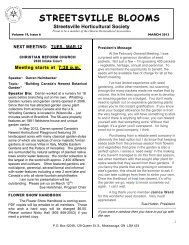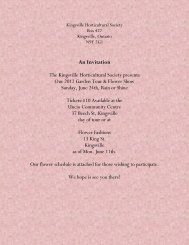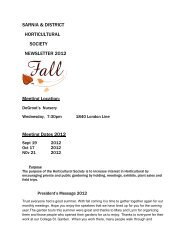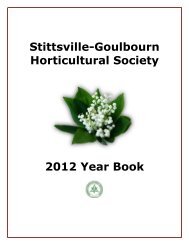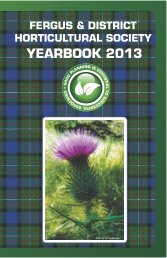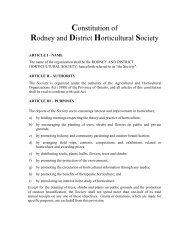Glen Morris Horticultural Society - Ontario Horticultural Association
Glen Morris Horticultural Society - Ontario Horticultural Association
Glen Morris Horticultural Society - Ontario Horticultural Association
Create successful ePaper yourself
Turn your PDF publications into a flip-book with our unique Google optimized e-Paper software.
<strong>Glen</strong> <strong>Morris</strong><br />
<strong>Horticultural</strong> <strong>Society</strong><br />
Established 1951<br />
<strong>Ontario</strong> <strong>Horticultural</strong> <strong>Association</strong> — District 6<br />
A Carolinian District<br />
COMING EVENTS<br />
Monday, May 6, 2013<br />
<strong>Glen</strong> <strong>Morris</strong> Hort. Meeting<br />
<strong>Glen</strong> <strong>Morris</strong> School, 7:30 p.m.<br />
“Hard Shelled Gourds” - Paul<br />
and Cathy Arrowsmith<br />
Saturday, May 11, 2013<br />
Annual Plant Sale<br />
Half-Way Café, <strong>Glen</strong> <strong>Morris</strong><br />
8:00 a.m. to 12:00 p.m.<br />
Volunteers Needed to Help<br />
Wednesday, June 12, 2013<br />
Annual Bus Trip<br />
Grimsby, Beamsville Area<br />
$45 - Details to Follow<br />
Newsletter by Margaret Fleury<br />
EXECUTIVE<br />
President: Marion Morton<br />
519-442-1319<br />
john.morton@silomail.com<br />
Past President: Joan Sims<br />
519-442-4681<br />
j1sims1@yahoo.com<br />
Vice-President: Margaret Fleury<br />
519-442-4018<br />
mfleury58@gmail.com<br />
Secretary: Nancy McComb<br />
519-448-3821<br />
nmccomb@sympatico.ca<br />
Treasurer: Jennifer Hager<br />
519-442-5152<br />
wjh617@sympatico.ca<br />
DIRECTORS<br />
Maria Fernandes<br />
519-624-8455<br />
brasilia@hotmail.ca<br />
Ellen Horak<br />
519-623-9352<br />
ehorak@rogers.com<br />
Pat Locker<br />
519-448-1081<br />
patrice@silomail.com<br />
Brenda Otawa<br />
519-624-4242<br />
minhort@rogers.com<br />
Florence Rothwell<br />
519-740-7136<br />
Michele Schraa<br />
519-740-7180<br />
onthegrand_449@rogers.com<br />
Jane Wyse<br />
519-442-4865<br />
wyse@brant.net<br />
Website: www.gardenontario.org/site.php/glenmorris<br />
Pat Locker Honoured<br />
Our very own Patrice<br />
Locker received the OHA<br />
District Six Service<br />
Award at the Spring<br />
Workshop and Flower<br />
Show, Saturday, April 20.<br />
This honour was bestowed<br />
upon Pat for her outstanding<br />
contributions in the<br />
advancement of horticulture<br />
on a <strong>Society</strong>, District,<br />
Provincial and Community<br />
level.<br />
Hort Happenings<br />
Pat has made leading edge<br />
contributions in the fields<br />
of leadership, creativity,<br />
volunteerism, and membership<br />
advancement.<br />
As a member of the<br />
GMHS for over 45 years,<br />
Pat was instrumental in<br />
organizing the first Plant<br />
Sale, a Coffee Party and a<br />
day-long Bus Trip which<br />
are still ongoing.<br />
Pat has published many<br />
articles and booklets dealing<br />
with horticulture.<br />
Her involvement as a<br />
Master Gardener has<br />
been exceptional.<br />
We are very proud of you,<br />
Saint Pat!<br />
Share a Seed (Seedy Saturday)<br />
Pat Locker advises that<br />
seeds from common annuals<br />
are easily saved.<br />
Collect seeds when flowers<br />
are dying. The seeds will<br />
be in the calyx at the bottom.<br />
A swelling there will<br />
hold the seeds. Look for<br />
brown, ripe seeds.<br />
Petunias form a small<br />
round pod. Impatiens<br />
form a small green pod<br />
which can open unexpectedly.<br />
Tying a bag over the<br />
seed head can help catch<br />
the seeds.<br />
Seeds from Zinnias and<br />
Marigolds are at the bottom<br />
of dead flowers. They<br />
are brown with an old petal<br />
attached.<br />
May 2013 - 5th Issue<br />
Tip of the Month:<br />
Conserve water by using<br />
a Rain Barrel. Cover to<br />
keep out mosquitoes.<br />
Moving water attracts<br />
birds and bees. Change<br />
water often in bird baths.<br />
May 3-5: Royal Botanical Gardens Garden Show and Plant Sale, Burlington<br />
July 19-21: 107th OHA Convention, “Up North and Down to Earth,” Thunder Bay<br />
July 28: Annual Community BBQ, GMHS and <strong>Glen</strong> <strong>Morris</strong> Lion’s Club<br />
5:00 to 8:00 p.m., <strong>Glen</strong> <strong>Morris</strong> Centennial Hall. Take your own lawn chair.<br />
August 6: Coffee Party, Home of Ellen and Jerry Horak, 9 Eagle Ridge Court<br />
10:30 a.m.: Take a lawn chair and something horticultural in a brown bag ($10.00<br />
or less). This is a fun time and a chance to get to know one another.<br />
Seeds must be dry to<br />
save. Try biting one to<br />
ensure it is hard and dry.<br />
Place seeds in an airtight<br />
jar. Store them in the<br />
refrigerator or a cool, dry<br />
place. Be sure to label<br />
them. Later, the seeds<br />
can be placed in clearly<br />
labeled envelopes for<br />
trading.
Special Recognition<br />
New Plants for 2013<br />
Métis Bee Cabin<br />
On behalf of the <strong>Glen</strong> <strong>Morris</strong><br />
<strong>Horticultural</strong> <strong>Society</strong>,<br />
President Marion Morton<br />
accepted the Special Recognition<br />
Award from Diane<br />
Elliot, Assistant District<br />
Director (left), for hosting<br />
the District 6 Spring Breakfast<br />
Meeting in February<br />
2012.<br />
Facts About Honey<br />
* Honey is the only food on the planet that will<br />
not rot or spoil.<br />
* If honey crystallizes, place in hot (not boiling)<br />
water until it liquefies.<br />
* Never boil honey or place in a microwave<br />
since this will kill the good enzymes.<br />
* Regularly eating a paste of honey and cinnamon<br />
powder can be a natural alternative in the<br />
treatment of cholesterol, arthritis, bladder infections,<br />
heart disease, and other ailments.<br />
* Honey provides a quick source of energy.<br />
* Canada has approved royal jelly as a natural<br />
dietary supplement for its athletes.<br />
Check out new cultivars for 2013 at www.landscapeontario.com.<br />
Perennials:<br />
* Coreopsis ‘Mercury Rising’ Tickseed<br />
* Echinacea ‘Sombrero Sandy Yellow’ Coneflower<br />
* Gaillardia ‘Sun Flare’ Blanket Flower<br />
* Heuchera ‘Little Cuties’ Coral Bells<br />
* Hosta ‘Rainbow’s End’ Hosta<br />
Annuals:<br />
* Begonia ‘Honeymoon Million Kisses’ Trailing Begonia<br />
* Calibrachoa ‘Can-Can’ Calibrachoa<br />
* Impatiens Walleriana ‘Patchwork’ Impatiens<br />
* Lantana Camara ‘Luscious’ Lantana<br />
* Zinnia ‘Double Zahara Strawberry’ Zinnia<br />
Hummers Here Soon<br />
Hummingbirds will soon be passing through our area. Put your<br />
feeders out now to encourage them to stop and stay. I have six!<br />
The males will arrive first and claim a feeder. The females will<br />
follow shortly after. I always put out lots of feeders to cut down<br />
on the fighting. Those males are such bossy birds! A male will<br />
only allow his mate and his offspring to drink. For the nectar,<br />
mix 4 parts water to one part sugar. Do NOT use red food colouring<br />
in the sugar water. Change the water weekly. I look forward<br />
to seeing my energetic little gems once again.<br />
Jerry Clarke and his daughter, Tobias, were guest speakers at our General Meeting, Monday, April 8. They are<br />
members of the Hamilton Wentworth Métis Council and currently live in Port Dover. They travel extensively to<br />
share their knowledge of bee-keeping and the many benefits of having bees in our gardens. Jerry started raising<br />
bees in 2005. He opened The Métis Bee Cabin, a family run business, in Port Dover in 2011. They sell honey products<br />
and Native arts and crafts online at www.metisbeecabin.com.<br />
Of the 22,000 bee species in the world, only 7 produce honey. 800 species live in Canada.<br />
Honeybees account for 80% of all pollination. Without bees, there would be a significant<br />
decrease in the yield of fruits and vegetables. Bees are presently in serious decline.<br />
Honeybees have a highly organized society. Each hive contains one queen that can live<br />
for 7-8 years. She lays up to 2000 eggs per day and eats royal jelly. The worker bees are<br />
females that are not able to reproduce. They live 4-8 weeks during busy summer months<br />
while they guard, housekeep, nursemaid, construct, and forage for pollen and nectar.<br />
One billion flowers are needed to produce one pound of honey. Workers protect the hive<br />
and will sting if the hive is threatened but will die afterwards. The drones, or males, are<br />
kept on standby during the summer for mating a virgin queen. Because they are of no<br />
use in the winter, drones are expelled in autumn and die.<br />
Worker bees will fly up to 30 km to collect nectar but they will not fly in the rain. Bees cannot swim, so if you have<br />
a water source, add wine corks, pieces of wood, or small rocks for them to stand on while drinking. Spraying for<br />
weeds is harmful to bees. In Spring, dandelions are their first source of nectar so do not spray them. Petri Oil is a<br />
natural bug repellent. Bees do not like the smell of Marigolds which are also natural repellents. If you must<br />
spray, do so in the early morning or late in the day to lower the spread of pesticides by wind. Bees that live on the<br />
ground need loose soil, free of mulch, to build their hives. Place dryer lint outside for bees to use in their hives.<br />
Bees are hard-working, fascinating creatures of great benefit to mankind. We need to protect them at all costs.


